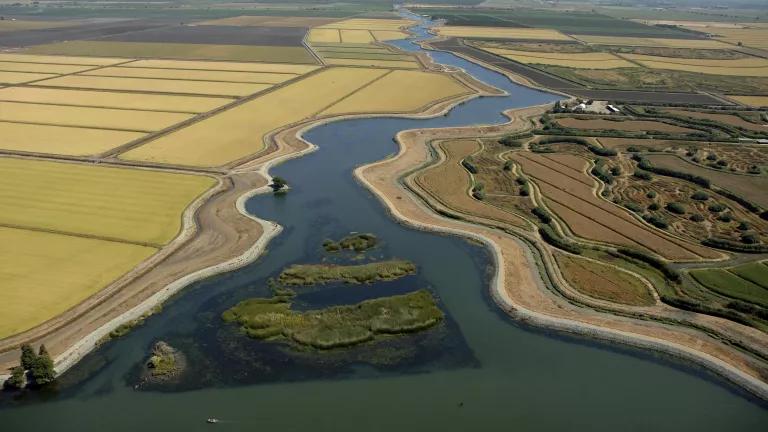Tejon Ranch Co. Sued for Breach of Conservation Agreement
Although the litigation has been filed only as a last resort, there is no question of its necessity.

Tejon Ranch
NRDC, Sierra Club, Audubon, Planning and Conservation League, and Endangered Habitats League challenge Tejon’s failure to comply with landmark 2008 Tejon Ranch Conservation and Land Use Agreement.
Twelve years after signing one of the largest conservation agreements in California history -- preserving 90 percent of the magnificent 270,000-acre Tejon Ranch -- the environmental signatories filed suit today against landowner and fellow signatory Tejon Ranch Company (“Company”). The complaint, filed in Kern County Superior Court, alleges that, beginning October 1, 2020, the Company breached its obligation under the Tejon Ranch Conservation and Land Use Agreement (“RWA” or “Agreement”) by failing to make promised Advance Payments in the amount of $800,000 per year to the Tejon Ranch Conservancy – a non-profit organization created under the Agreement to oversee conservation of the protected lands at Tejon Ranch, foster scientific research, and manage public access.
Although the litigation has been filed only as a last resort -- after extensive but unsuccessful efforts by NRDC and its environmental partners to avoid it -- there is no question of its necessity. The Advance Payments guaranteed by the Agreement are the principal source of funding for the operations of the non-profit Conservancy, and they are essential if the organization is to perform its critical conservation role at Tejon Ranch – for the unique habitat and for its diverse array of species.
Until 2020 the Company has never disputed its financial obligation under the explicit guarantee of the 2008 Agreement. Although the Company withheld funding in April 2020 in an attempted unilateral amendment of the RWA’s payment schedule -- citing general concerns about the COVID-19 pandemic -- it rescinded that action two months later when the Conservancy and its environmental partners initiated formal proceedings for breach.
On October 1, 2020, however, the Company tried again, this time alleging that the Conservancy and its environmental partners had violated a “non-opposition” provision of the Agreement – a provision prohibiting the signatories from opposing the Company’s proposed development projects on the unprotected ten percent of the Ranch property.
Specifically, the Company cited the participation by several of the organizations in a voluntary process to develop a regional conservation plan in the Antelope Valley in 2017 -- called the Antelope Valley Regional Conservation Investment Strategy (“AVRCIS”). But while citing the non-opposition provision, the Company has ignored the RWA’s very next provision that explicitly allows precisely such activity – that is, participation by any of the Agreement’s signatories in supporting or opposing a “regional plan of general applicability.”
In negotiating the Agreement, NRDC and its environmental partners insisted on this provision in order to protect our ongoing regional advocacy on a wide range of environmental media (air, water, climate, conservation, species, land use, etc.) that might incidentally affect the Ranch Company’s development projects but not be focused on them. Although the Company agreed to this provision in 2008, the Company – now under new leadership -- has simply chosen to ignore or dispute its unequivocal meaning and direct application in order to justify withholding of the Advance Payments.
When efforts over the past couple of months through a meet and confer process prescribed in the Agreement failed to dissuade the Company from abandoning its financial commitment to the Conservancy, today’s litigation became the only option to stop it.
NRDC and its colleague organizations are deeply disappointed by the Company’s disavowal of its unequivocal contractual obligation. Twelve years after the RWA was signed, we remain fully committed to the commitments we made and have worked in good faith since 2008 to fulfill. The Company’s attempt to suggest otherwise is no more than a pretext for its apparent determination to undermine the financial footing of the Conservancy -- one way or another.
It may be no mere coincidence that the environmental representatives seeking to enforce the Agreement are largely the very same people who negotiated and signed it in 2008 and who have worked hard ever since to implement the deal consistent with its terms. By contrast, the original Tejon Ranch partnership that negotiated the Agreement has disappeared, leaving only the Tejon Ranch Company.
And even the Tejon Ranch Company has seen a leadership change at the top. Its former CEO Robert Stine announced the Agreement with enormous pride at a press conference with the Governor on May 8, 2008, declaring that “[t]he Agreement we’ve reached is good for conservation, good for California and good for the company and its shareholders.” When he retired in 2013, he was replaced by Gregory Bielli, a master planned community developer who, based on the Company’s breach, seems less than enthusiastic about the conservation deal he inherited but apparently fails to fully understand.
The extraordinary history and natural resources of Tejon Ranch have made it a place uniquely worth fighting for. Early Native American communities prospered there. Kit Carson and John Fremont scouted there, where California condors soar today over a unique crossroads of natural habitats and rare species. Giant oaks, towering incense cedar, ancient Joshua trees, and sprawling California sycamores, along seasonal streams, still thrive there, and each spring the foothills and desert lowlands are submerged in a sea of wildflowers.
All of this remains as invaluable today as it was in 2008, and we are determined to ensure that the non-profit Conservancy charged with its protection receives the full financial support that the 2008 Agreement guarantees for that conservation purpose. Today’s lawsuit against the Tejon Ranch Company – filed with deep regret at the Company’s breach of its promise -- is the latest evidence of that determination.




